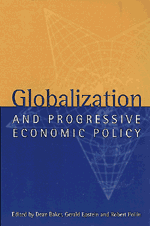Book contents
- Frontmatter
- Contents
- List of figures
- List of tables
- List of contributors
- Editors' acknowledgments
- 1 Introduction
- I The IMF, the World Bank, and neo-liberalism
- II Foreign direct investment, globalization, and neo-liberalism
- III Globalization of finance
- IV Trade, wages and the environment: North and South
- 10 Openness and equity: regulating labor market outcomes in a globalized economy
- Comment by Jaime Ros
- 11 Integration and income distribution under the North American Free Trade Agreement: the experience of Mexico
- Comment by Thea Lee
- 12 Malthus redux? Globalization and the environment
- Comment by Peter Dorman
- V Migration of people in a global economy
- VI Globalization and macroeconomic policy
- Bibliography
- Index
12 - Malthus redux? Globalization and the environment
Published online by Cambridge University Press: 04 August 2010
- Frontmatter
- Contents
- List of figures
- List of tables
- List of contributors
- Editors' acknowledgments
- 1 Introduction
- I The IMF, the World Bank, and neo-liberalism
- II Foreign direct investment, globalization, and neo-liberalism
- III Globalization of finance
- IV Trade, wages and the environment: North and South
- 10 Openness and equity: regulating labor market outcomes in a globalized economy
- Comment by Jaime Ros
- 11 Integration and income distribution under the North American Free Trade Agreement: the experience of Mexico
- Comment by Thea Lee
- 12 Malthus redux? Globalization and the environment
- Comment by Peter Dorman
- V Migration of people in a global economy
- VI Globalization and macroeconomic policy
- Bibliography
- Index
Summary
Introduction
High and growing levels of consumption in the developed countries, coupled with high and only slowly declining rates of population growth in less-developed countries, pose a serious threat to the environment and ultimately to human welfare. Local ecological problems faced today are dramatic: overgrazing and overfishing, deforestation, fresh-water shortages, urban air pollution, pesticide poisoning, wetlands loss. Even more challenging are threats to the global environment: global warming, loss of biodiversity, ozone depletion. We need only consider that over the next 50 years world population will likely at least double, and world gross domestic product triple (World Bank 1992, 26), to see the potential for a Malthusian (or “neo-Malthusian”) day of reckoning on the horizon.
Given these grim trends, one can nevertheless still sketch out an approach to achieving a sustainable global future – sustainable in the economic sense of nondeclining welfare for the average person (Pezzey 1992). Following the Bruntland Commission (World Commission on Environment and Development 1987), it is taken here as a given that balanced economic growth in developing countries is vital to insure sustainability. For our purposes, balanced growth means a growth process that significantly raises living standards for the bottom half of the income distribution.
Such growth will be necessary to boost per capita health, sanitation, education, and social insurance expenses to deal with the needs of rapidly growing populations. Provision of these necessities to poor families, in turn, will lay the foundation for lower population growth rates (Dasgupta 1995).
- Type
- Chapter
- Information
- Globalization and Progressive Economic Policy , pp. 297 - 318Publisher: Cambridge University PressPrint publication year: 1998
- 1
- Cited by



